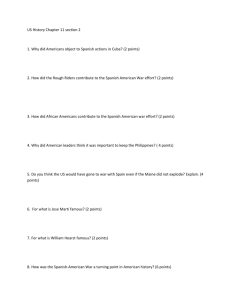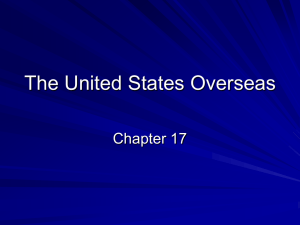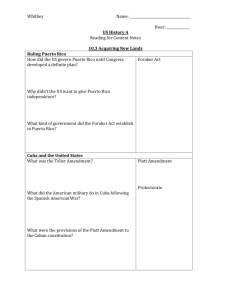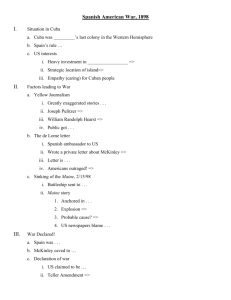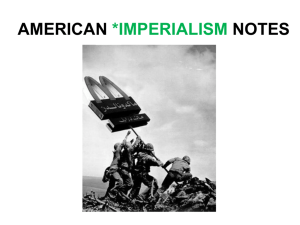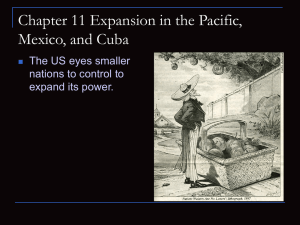File - Mr. Patrick Haughaboo
advertisement
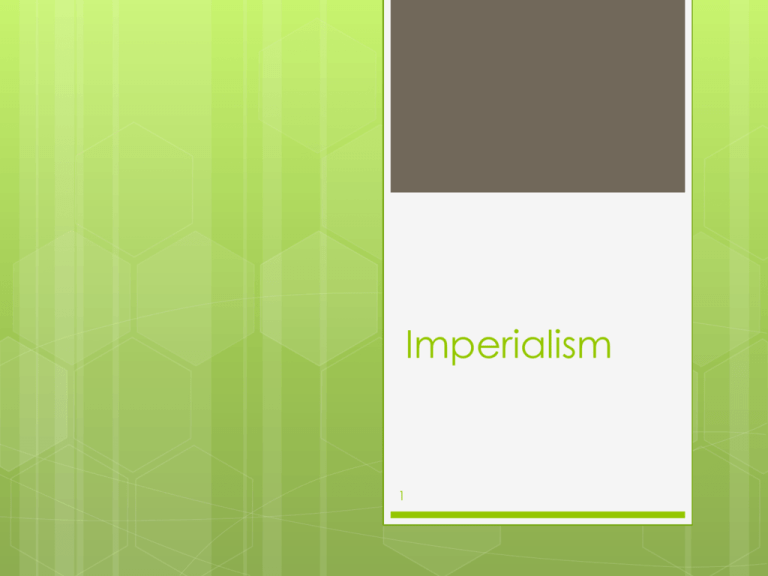
Imperialism 1 2 Imperialism Stronger nations take over weaker nations The US will expand its borders=Manifest Destiny New markets for trade Raw materials Need for military bases 3 Desire for Military Strength Admiral Alfred Mahan The Influence of Sea Power Upon History Build up a strong navy to compete with strong countries The Great White Fleet 4 Taking New Lands William Seward, Secretary of State Purchased Alaska from Russia in 1867 Called “Seward’s Icebox” Alaska provided oil, timber Becomes a state in 1959 5 US takes Hawaii Hawaii was a stopping point for American shippers heading to China for trade Hawaii had sugar plantations, and sold mostly to the US-many owned by Americans 1875- the US agreed to import Hawaiian sugar tax free Hawaiian sugar production increased drastically 6 US Takes Hawaii part 3 In 1891, Queen Liliuokalani rises to power She changes Hawaiian constitution to allow all citizens to vote (not just land owners-who where mostly American) This angered the Americans on the island and they organized a revolution against the Queen The queen was overthrown and the people of Hawaii requested the assistance of the US 7 US takes Hawaii continued McKinley Tariff of 1890 raised tariffs on Hawaiian sugar Hawaiian sugar planters now faced real competition In the mean time, the US pressured the Hawaiian government to allow us a military base at Pearl Harbor Due to financial instability, the people of Hawaii begged for American assistance 8 US takes Hawaii part 4 Sanford Dole established a government in Hawaii (similar to that in the US) Hawaii becomes an American territory in 1898 Hawaii becomes a state in 1959 Section 2 9 10 Cubans Rebel Against Spain Spain controlled the Philippines, Guam, Cuba, Puerto Rico The US was interested in purchasing Cuba, but the Spanish refused to sell A Cuban rebel named Jose Marti was tired of Spanish rule and led a revolution Americans began to support this rebellion in hopes of gaining territory 11 Spain sent Valeriano Weyler to Cuba in hopes of ending the rebellion He imprisioned Cubans into concentration camps to keep them from fighting American journalists heard about this and published articles in support of the Cubans 12 Yellow Journalism and the rebellion Yellow Journalism was created (exaggerated news to enrage readers) William Randolph Hearst and Joseph Pulitzer competed for stories in their papers These stories encouraged Americans to join in the Cuban rebel cause “You furnish the pictures and I’ll furnish the war” Hearst 13 The De Lome Letter Enrique De Lome, Spanish minister to the US, wrote a letter that was published in the NY Journal It insulted President McKinley for not taking military action to aid Cuba Americans were insulted by the Spanish for this man’s behavior 14 The USS Maine sinks McKinley ordered for the USS Maine to go to Cuba and bring home any American citizens who were there On February 15, 1898, the Maine exploded in the Havana harbor 260 men killed As a result of this, Americans will urge Congress to declare war “Remember the Maine” 15 The Spanish-American War McKinley asked Congress to declare war on Spain (April 1898) George Dewey leads Americans to victory in the Philippines (Manila Bay) Filipinos led by Emilio Aguinaldo will fight with American forces to overthrow Spanish rule William Sampson will lead Americans to victory in the Caribbean Both regions prove US Naval strength 16 The War in Cuba Troops not well prepared and were not properly dressed (wore wool uniforms) Leonard Wood and Theodore Roosevelt led a volunteer Calvary unit called the Rough Riders Defeated Spanish at Santiago (near Kettle Hill) and moved on to San Juan Hill These victories allowed the US to lead infantry attacks, leading to Spanish surrender 17 18 Treaty of Paris Signed by the US and Spain Spain freed Cuba Guam and Puerto Rico given to the US Spain sold the Philippines to the US for $20 million 19 Section 3 20 21 US Rule in Puerto Rico Puerto Rico was under military rule during the Spanish-American War Congress then passed the Foraker Act to end military rule and established a civil government Puerto Ricans were later granted citizenship and elect their own legislature 22 Cuba and the US The US recognized the independence of Cuba, yet American troops occupied Cuba after the war Cuba writes a constitution declaring their independence but doesn’t recognize a relationship with the US The US urged them to accept the Platt Amendment US wouldn’t withdraw troops until Platt Amendment was accepted 23 Platt Amendment US can intervene in Cuban affairs Cuba cannot make treaties that would allow another nation to control them Cuba cannot go into debt that it cannot pay US can buy/lease land in Cuba for military bases (Guantanamo Bay) Cuba becomes an American protectorate 24 25 Filipinos Rebel Emilio Aguinaldo, Philippine rebel, wanted independence from US American troops had imprisoned Filipinos into unsanitary camps (starvation and disease killed many) Aguinaldo leads a revolt against American troops US forces will put down rebellion after 3 years of fighting 26 US sets up government similar to the one in Puerto Rico William Taft was appointed as Governor, he worked to rebuild the region and advance it with education and religion 27 28 Foreign Influence in China China would provide the US with new markets Secretary of State John Hay wrote the Open Door Policy requesting that all countries should share trade rights with the US This allowed the US to trade freely with China 29 The Boxer Rebellion While China was an independent country, many Europeans filled the large cities Many Chinese wanted to rid the country of “foreign devils” A secret group called the Boxers led a rebellion against foreigners, missionaries, and Chinese who converted to Christianity Troops from several countries (including US) joined together to put an end to this rebellion 30 Opposition to Expansion While the US is expanding its territories, not everyone approves The Anti-Imperialist League formed stating it was wrong for the US to claim and rule lands without the people’s consent Jane Addams, Andrew Carnegie, Mark Twain, Pres. Cleveland Section 4 31 32 Teddy Roosevelt and the World Peacemaker: TR will negotiate the end of the Russo-Japanese War. He wins a Nobel Peace Prize Panama Canal: we needed a canal across Central American to better trade. TR purchased the canal for $10 million plus annual rent of $250,000 33 34 Roosevelt Corollary Latin American nations borrowed millions from European banks TR worried that if they didn’t repay loans, that war could break out in the Western Hemisphere TR reminded Europe about the Monroe Doctrine (Europe must stay out of Latin American affairs) He added that the US would be the police force of Latin America 35 Wilson’s Missionary Diplomacy The US had the moral obligation to deny recognition to any Latin American government that we viewed oppressive, undemocratic, or hostile Wilson will pressure countries to establish democracies 36 Mexican Revolution Mexico had been under military rule, yet they were friendly with the US The dictator, Diaz, was overthrown by Francisco Madero (who led peasants and workers). Sadly, Madero was murdered by General Victoriano Huerta who established an unfair government in Mexico The US will intervene with troops and eventually Huerta will fall 37 Victor Carranza rises to power and established a government that would be recognized by the US However, rebels under the command of Pancho Villa and Emiliano Zapata will try and defeat Carranza and his government The US would not aid the rebels, the rebels attacked a US city 38 American forces led by John J. Pershing will search for Villa and his men Carranza demanded the US troops to withdraw, Wilson refused Both sides will come to a cease-fire a year later Wilson must prepare for war in Europe while Carranza will rule oppressively for 3 more years
